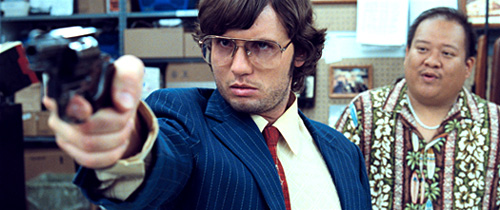|
Reviews of Recent Independent, Foreign, & Documentary Films in Theaters and DVD/Home Video
Written & Directed by Andrew Piddington Produced by Rakha Singh Director of Photography, Roger Eaton Edited by Tony Palmer Music by Makana Released by IFC Films Country of Origin: UK. 114 min. Not Rated With Jonas Ball, Krisha Fairchild, Gunter Stern, Gail Kay Bell, Mie Omori, Robert Kirk & Richard Sherman The story of Mark David Chapman, John Lennon’s assassin, is one of the most riveting celebrity-stalker tales in recent history. Chapman, a 25-year-old narcissist who struggled with insanity throughout his life, was obsessed with Taxi Driver and The Catcher in the Rye; his murderous rage could just have easily targeted a different celebrity than Lennon. Andrew Piddington’s film builds its suspense like a crime drama, but never takes liberties with facts. The first-person voice-over is culled entirely from interviews, depositions, and court transcripts, and there are no added imagined characters or subplots. Piddington follows Chapman from his home in Honolulu with his young, silent, Asian wife and brassy, disturbed mother to a series of New York City taxicabs, hotels rooms, and, fatefully, outside of the Dakota, Lennon’s grand home and the scene of the crime. Everything was shot on location. Convincing and frightening, Jonas Ball’s performance as Chapman captures the way a mentally ill person can descend into delusion while smugly, intractably maintaining the courage of his own dark convictions. The cast is made up largely of unknowns, so the film lacks the distraction of celebrity cameos and maintains a gritty realism. The Killing of John Lennon is an effective, satisfying exploration of what was going on in Chapman’s mind that led to a killing of this magnitude. It doesn’t hold the viewer’s hand when it comes to considering the deeper twists in Chapman’s psyche, but it also doesn’t bore us by becoming arty or abstract. One innovative and inspired touch is Piddington’s choice not to use any Beatles music in the soundtrack. Although there’s a scene of Chapman compulsively listening to the Beatles over and over, dissecting the details and meaning of each song until he works himself into a frenzy, the film’s spare score leaves us only hearing the white noise in Chapman’s head.
Any world-changing crime is also a snapshot of the historical moment in which it takes place. The Killing of John Lennon is a strong,
memorable study of madness, of the way anger metastasizes, but it’s also a dark look at late 1970s/ early 1980s America
in a time of social transition, and at how a person’s illness could spiral out of control, unchecked, with gruesome results.
Elizabeth Bachner
|

